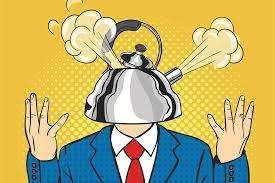By Dr. Alan Leavens
Dear Dr. Alan: You have written a few times about different aspects of depression and anxiety, and also a little about anger and meanness. Can you say more about anger? I’m seeing more anger in people than depression lately, and I assume that this is connected to the virus.
You’re certainly not alone in experiencing an increase in anger everywhere. A recent study (NTU Singapore) found that global sentiments toward Covid-19 have been shifting from fear to anger. Twenty million tweets (!) related to this virus were analyzed and it was seen that fear, which was seen most often at the beginning of the pandemic has tapered off in time, being resoundingly replaced by expressions of anger, much of it reflecting emotions that have grown out of isolation and social distancing, as well as political divisiveness. The study looked at worldwide data, but also compared different countries. Whereas Singapore (from where the study originated) showed a moderate balance of positive attitudes such as pride, kindness, and resilience, it probably comes as no surprise that certain other countries showed strong negative expressions dominating social media posts.
Generally, polls are showing that people’s anger appears more often and is more persistent than it was prior to the pandemic. And, of course, there’s lots to be angry about. Just watching the news for a few minutes at a time will provide a wellspring of reasons to be upset. And anger can be directly and indirectly provoked and ignited by other emotions, such as anxiety. As we’ve seen, the virus has generated much anxiety everywhere. Often, someone who is trying to manage or control their anxiety looks for ways to mitigate that feeling. So they end up finding something or someone to be angry at as a way of reducing their anxiety, anger being thought of by many, as a more acceptable emotion. It’s way too easy to express our anger at ubiquitous and unrelenting political opinions and the ways (some acceptable, some not) that people think of and manage their health, which can affect our health.
So many people are experiencing increased stress in their lives, due to financial pressures, social issues, almost constant and unending negative news, that it is surprising that anybody can be immune to anger and anxiety at all. A significant decrease in outside activities as a direct result of COVID-19, has removed an important antidote to all that stress. Thus, it is more important than ever to find and partake in alternate means of calming and satisfying ourselves. One of the easiest solutions is to increase our social contacts by whatever means available. This will provide support to us from others, allow us to provide some support to someone else and to learn what others are doing to dial back the stress in their lives. We can increase our contacts with family and friends, make new friends on social media, and find things that provide joy and laughter, instead of anger and fear.
Alan Leavens PhD, is a California licensed Clinical Psychologist, living and working in SMA. For questions or concerns that you wish him to address, please email: aleavens@drleavens.com

